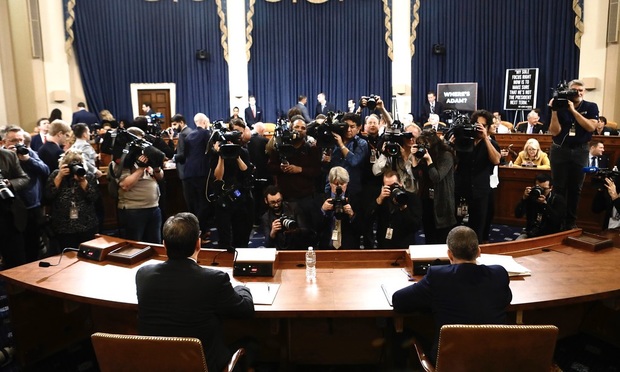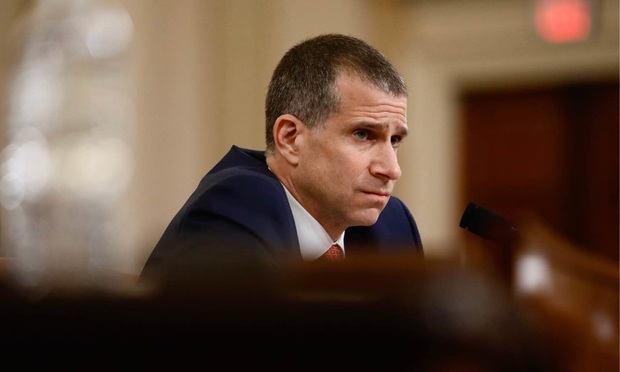Barry Berke Urges Trump's Impeachment, or 'Imagination Is the Only Limit' on Presidential Abuses of Power
Berke and GOP counsel Stephen Castor were among those appearing before a House committee to present evidence gathered in the impeachment inquiry.
December 09, 2019 at 01:23 PM
5 minute read
 House impeachment hearing Dec. 9. Barry Berke, left, and Steve Castor, right, appear to testify. Credit: Diego M. Radzinschi / ALM
House impeachment hearing Dec. 9. Barry Berke, left, and Steve Castor, right, appear to testify. Credit: Diego M. Radzinschi / ALM
House Judiciary Committee counsel Barry Berke made the case for impeaching President Donald Trump on Monday, laying out three offenses that he said are grounds to potentially remove the president from office.
During his 30-minute opening statement, the Kramer Levin Naftalis & Frankel partner argued there are three main examples of "high crimes and misdemeanors" committed by Trump: abuse of power, betrayal of the national interest and corruption of elections.
Berke, along with the House Intelligence Committee's chief investigator Daniel Goldman and GOP counsel Stephen Castor, appeared before the House Judiciary Committee on Monday to present evidence gathered in the impeachment inquiry.
They gave their testimony days after Speaker Nancy Pelosi instructed Democrats to move forward with articles of impeachment against Trump. The Judiciary Committee also heard testimony last week from four constitutional scholars about impeachment.
Berke's argument focused largely on the conduct by Trump in pushing Ukraine to investigate his political rival, former Vice President Joe Biden, in exchange for releasing military aid to the country. Berke also touched upon conduct from special counsel Robert Mueller's probe, specifically Trump's efforts to get then-White House counsel Don McGahn to have Mueller fired and then create a false record over that attempt.
That signals that articles of impeachment against Trump will focus on Ukraine, as it has for much of the inquiry, but reach back to the Mueller probe to establish a larger pattern of conduct by the president.
It's that pattern of allegedly corrupt behavior that Berke said is reason for the House to impeach Trump, and to do it quickly before the November 2020 election. Berke said it's possible Trump could attempt to interfere in the presidential election again.
And he pointed to testimony from constitutional law scholar Michael Gerhardt before the committee last week, when Gerhardt said, "If Congress fails to impeach here, then the impeachment process has lost all meaning."
"If, in fact, President Trump can get away with what he did again, our imagination is the only limit to what President Trump may do next, or what a future president may do next to abuse his or her power to serve his own personal interests over the nations," Berke said.
Berke's argument also focused on Trump's intent, and the president's reliance on his personal lawyer, Rudy Giuliani, in seeking to enact a personal agenda in Ukraine.
And Berke pushed back against criticism from Republicans that the record is incomplete on impeachment.
"The reason we have not heard from all the witnesses and documents is because President Trump has obstructed the investigation," Berke said, teeing up obstruction of Congress to be another article of impeachment.
GOP lawmakers argued after Berke's testimony that he violated House rules by "impugning" Trump's motives. But House Judiciary Committee Chairman Jerry Nadler rejected the charge, saying that at a hearing about impeaching Trump, "none of us should find it surprising that we are hearing testimony that is critical of the president."
 Republican counsel Steve Castor prepares to testify Monday at a House impeachment hearing. Credit: Diego M. Radzinschi / ALM
Republican counsel Steve Castor prepares to testify Monday at a House impeachment hearing. Credit: Diego M. Radzinschi / ALMDuring his opening statement, Castor argued that Democrats are pursuing an improperly run impeachment inquiry. And he said lawmakers failed to follow proper procedures for subpoenas.
Those are similar to criticisms leveled by White House counsel Pat Cipollone. Both a House Judiciary Committee staff report on impeachment procedures, as well as the House Intelligence Committee's impeachment inquiry report, have said those arguments lack merit and are not based in fact.
Castor also suggested that when a subpoenaed witness, Charles Kupperman, went to court to contest the demand, Democrats chose not to pursue the case because they "didn't like the presiding judge," U.S. District Judge Richard Leon of the District of Columbia.
"Very simply, the evidence of the Democrat's impeachment inquiry does not support the conclusion that President Trump used his power for his own personal political path," Castor said.
Read more:
Bribery, Abuse of Power and Obstruction: Judiciary Committee Lawyers Lay Path for Impeachment
Cipollone Demands House End Impeachment or Send It to the Senate 'Fast'
'An Existential Threat': House Report Berates Pat Cipollone's Legal Claims on Impeachment Inquiry
As White House Stonewalls on Ukraine Docs, Wave of FOIA Suits Seek to Pry Them Loose
This content has been archived. It is available through our partners, LexisNexis® and Bloomberg Law.
To view this content, please continue to their sites.
Not a Lexis Subscriber?
Subscribe Now
Not a Bloomberg Law Subscriber?
Subscribe Now
NOT FOR REPRINT
© 2025 ALM Global, LLC, All Rights Reserved. Request academic re-use from www.copyright.com. All other uses, submit a request to [email protected]. For more information visit Asset & Logo Licensing.
You Might Like
View All
Trump Administration Faces Legal Challenge Over EO Impacting Federal Workers
3 minute read
US Judge Cannon Blocks DOJ From Releasing Final Report in Trump Documents Probe
3 minute read
Private Equity Giant KKR Refiles SDNY Countersuit in DOJ Premerger Filing Row
3 minute readLaw Firms Mentioned
Trending Stories
- 1Chief Judge Joins Panel Exploring Causes for Public's Eroding Faith in NY Legal System
- 2Pogo Stick Maker Wants Financing Company to Pay $20M After Bailing Out Client
- 3Goldman Sachs Secures Dismissal of Celebrity Manager's Lawsuit Over Failed Deal
- 4Trump Moves to Withdraw Applications to Halt Now-Completed Sentencing
- 5Trump's RTO Mandate May Have Some Gov't Lawyers Polishing Their Resumes
Who Got The Work
J. Brugh Lower of Gibbons has entered an appearance for industrial equipment supplier Devco Corporation in a pending trademark infringement lawsuit. The suit, accusing the defendant of selling knock-off Graco products, was filed Dec. 18 in New Jersey District Court by Rivkin Radler on behalf of Graco Inc. and Graco Minnesota. The case, assigned to U.S. District Judge Zahid N. Quraishi, is 3:24-cv-11294, Graco Inc. et al v. Devco Corporation.
Who Got The Work
Rebecca Maller-Stein and Kent A. Yalowitz of Arnold & Porter Kaye Scholer have entered their appearances for Hanaco Venture Capital and its executives, Lior Prosor and David Frankel, in a pending securities lawsuit. The action, filed on Dec. 24 in New York Southern District Court by Zell, Aron & Co. on behalf of Goldeneye Advisors, accuses the defendants of negligently and fraudulently managing the plaintiff's $1 million investment. The case, assigned to U.S. District Judge Vernon S. Broderick, is 1:24-cv-09918, Goldeneye Advisors, LLC v. Hanaco Venture Capital, Ltd. et al.
Who Got The Work
Attorneys from A&O Shearman has stepped in as defense counsel for Toronto-Dominion Bank and other defendants in a pending securities class action. The suit, filed Dec. 11 in New York Southern District Court by Bleichmar Fonti & Auld, accuses the defendants of concealing the bank's 'pervasive' deficiencies in regards to its compliance with the Bank Secrecy Act and the quality of its anti-money laundering controls. The case, assigned to U.S. District Judge Arun Subramanian, is 1:24-cv-09445, Gonzalez v. The Toronto-Dominion Bank et al.
Who Got The Work
Crown Castle International, a Pennsylvania company providing shared communications infrastructure, has turned to Luke D. Wolf of Gordon Rees Scully Mansukhani to fend off a pending breach-of-contract lawsuit. The court action, filed Nov. 25 in Michigan Eastern District Court by Hooper Hathaway PC on behalf of The Town Residences LLC, accuses Crown Castle of failing to transfer approximately $30,000 in utility payments from T-Mobile in breach of a roof-top lease and assignment agreement. The case, assigned to U.S. District Judge Susan K. Declercq, is 2:24-cv-13131, The Town Residences LLC v. T-Mobile US, Inc. et al.
Who Got The Work
Wilfred P. Coronato and Daniel M. Schwartz of McCarter & English have stepped in as defense counsel to Electrolux Home Products Inc. in a pending product liability lawsuit. The court action, filed Nov. 26 in New York Eastern District Court by Poulos Lopiccolo PC and Nagel Rice LLP on behalf of David Stern, alleges that the defendant's refrigerators’ drawers and shelving repeatedly break and fall apart within months after purchase. The case, assigned to U.S. District Judge Joan M. Azrack, is 2:24-cv-08204, Stern v. Electrolux Home Products, Inc.
Featured Firms
Law Offices of Gary Martin Hays & Associates, P.C.
(470) 294-1674
Law Offices of Mark E. Salomone
(857) 444-6468
Smith & Hassler
(713) 739-1250











